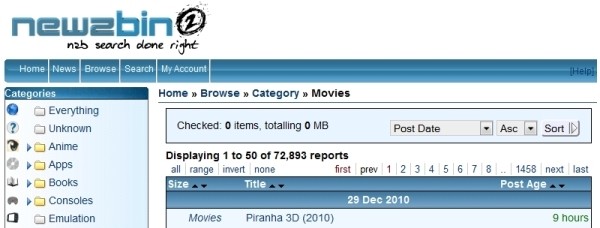On Thusrday, the British High Court ruled that British Telecommunications, one of the largest ISPs in the world, must block public access to Newzbin2, a popular source for downloading illegitimate copies of television shows and other media. The ruling is unprecendented in the United Kingdom and serves as a landmark victory for the Motion Picture Association, the MPAA's international counterpart, comprised of Hollywood heavyweights such as Fox, Warner Brothers, Universal and Walt Disney.
This is not the first time Newzbin has been the subject of legal matters. Just over a year ago, Newzbin was found guilty by a British judge for knowingly providing unauthorized access to copyrighted content. The usenet site was ordered to be shut down but Newzbin2, a clone of Newzbin, cropped up shortly after its closure. Unlike the original, Newzbin2 is hosted on the island nation of Seychelles and thus cannot be shut down by British courts. As a result however, it seems the High Court chose to simply block access to the usenet site all together.

BT, the world's oldest telecommunications company, has said it will not appeal the decision and calls the judgement "helpful". Simon Milner, Group Policy Director at BT, also commented on another precedent set by the judgement, requiring copyright holders to prove in court that a website infringes upon their copyrights before forcing websites to be blocked or shut down. This is the first clear ruling in the UK which requires copyright owners to do so prior to legal action.
"This is a helpful judgement, which provides clarity on this complex issue. It clearly shows that rights holders need to prove their claims and convince a judge to make a court order. BT has consistently said that rights holders need to take this route. We will return to court after the summer to explain what kind of order we believe is appropriate."
-- Simon Milner, Group Policy Director at BT
Not surprisingly, advocates for digital freedoms have shown mostly lament for the ruling, calling it a "dangerous" precedent with "serious risks" and have lambasted it as another method by which "our digital rights are to be determined by Hollywood, not parliament."
"Website blocking is pointless and dangerous. These judgements won't work to stop infringement or boost creative industries. And there are serious risks of legitimate content being blocked and service slowdown. If the goal is boosting creators' ability to make money from their work then we need to abandon these technologically naive measures, focus on genuine market reforms, and satisfy unmet consumer demand."
-- Peter Bradwell, representative from the Open Rights Group
On the other side of the aisle, parties which have a vested interest in the protection of copyrighted works applaud the judgement, iterating the importance of protecting creative arts, upholding laws and encouraging proactive responsibility among ISPs.
"This ruling from Justice Arnold is a victory for millions of people working in the UK creative industries and demonstrates that the law of the land must apply online. This court action was never an attack on ISPs but we do need their cooperation to deal with the Newzbin site which continually tries to evade the law and judicial sanction. Newzbin is a notorious pirate website which makes hundreds of thousands of copyrighted products available without permission and with no regard for the law."
-- Chris Marcich, President of the MPA